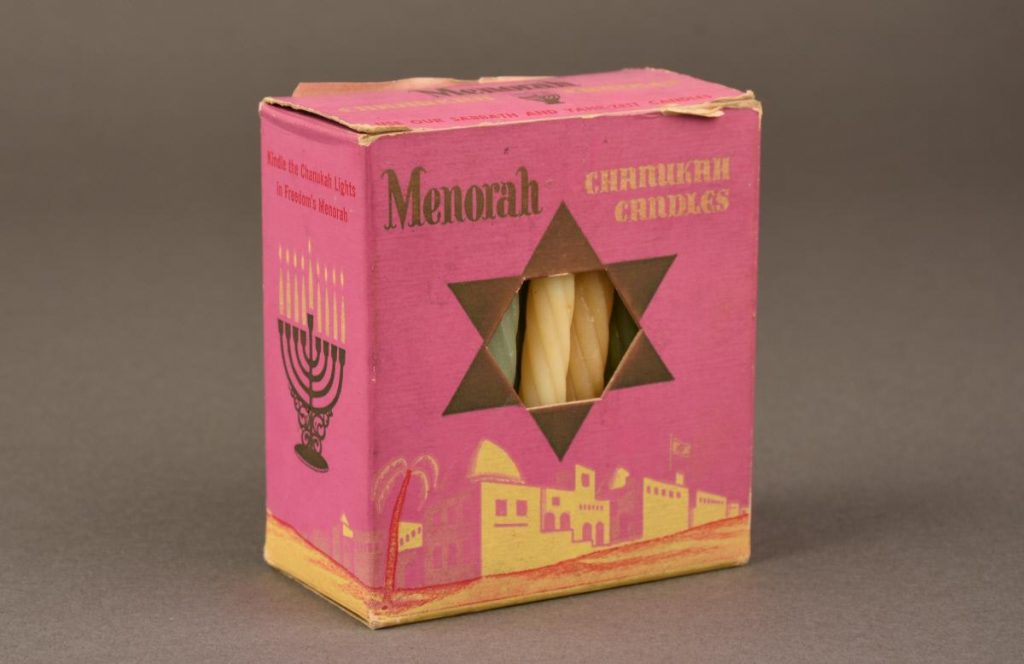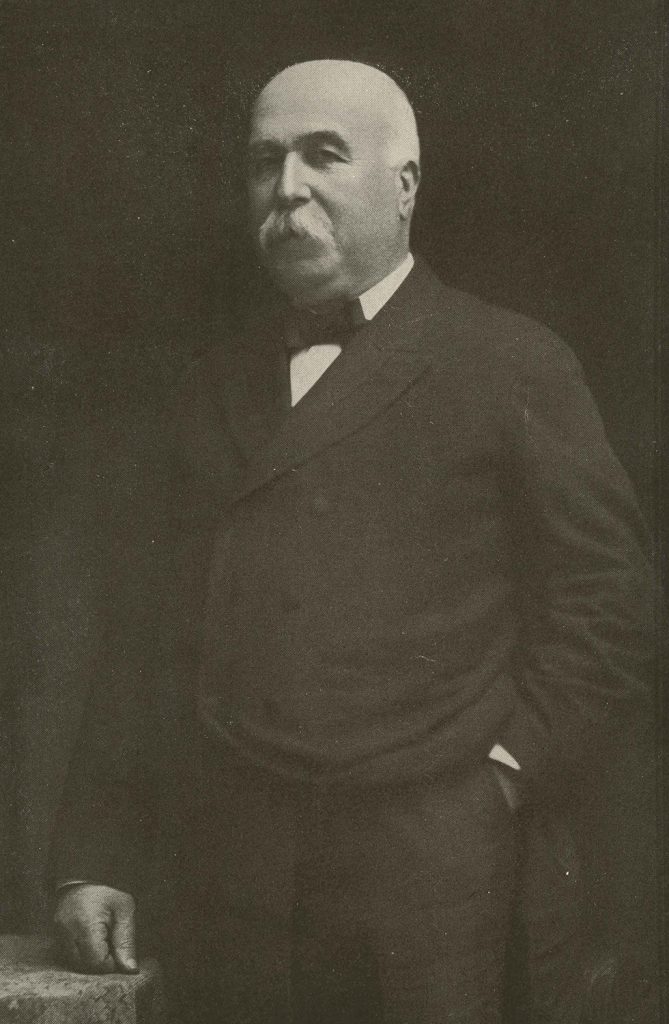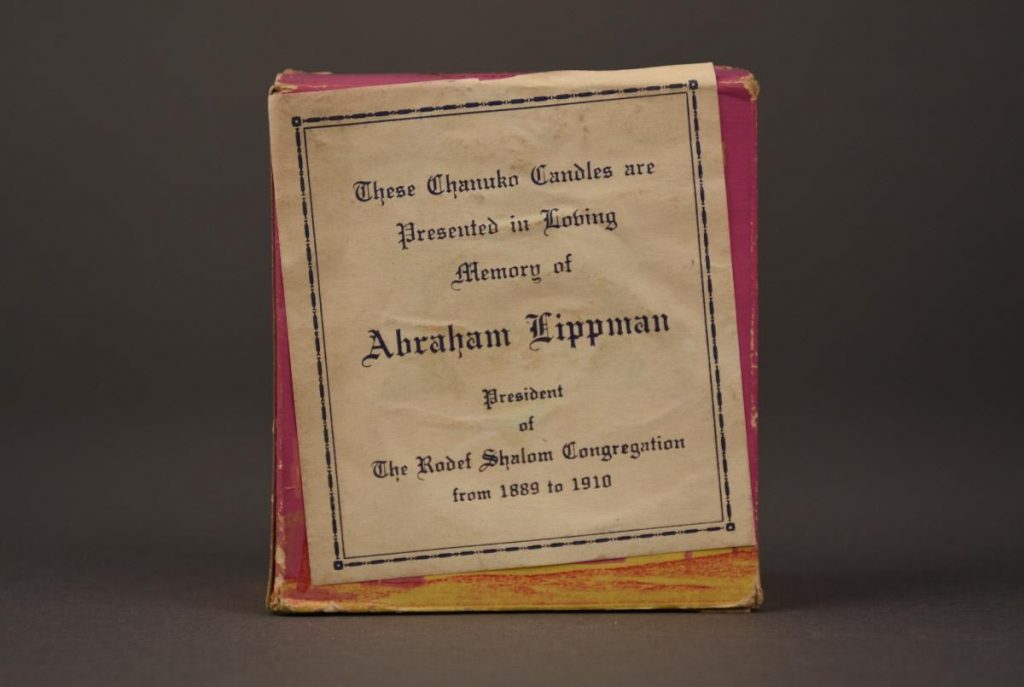In the Chanukah display of the A Very Merry Pittsburgh experience at the Heinz History Center is a box of candles with 120 years of history. The box itself is unremarkable, but a sticker pasted on its backside offers this intriguing note: “These Chanuko Candles are Presented in Loving Memory of Abraham Lippman, President of The Rodef Shalom Congregation from 1889 to 1910.”

Gift of Mark Aronson
Rodef Shalom is the oldest Jewish congregation in Western Pennsylvania, chartered in 1856. Its founders were immigrants, mostly from southern Germany. By the turn of the 20th century, many had attained great economic success in their new home.
In 1901, the congregation hired a young, dynamic rabbi named Dr. J. Leonard Levy. Looking at his new congregation, he worried that the economic success of the older generations would lead to, as one of his successors later described it, “an over-indulged, pampered and spiked generation” of children. And so, among his many initiatives, Dr. Levy devoted considerable energy to improving the religious home life of children. [1]
Chanukah provided a useful symbol. The story of the holiday concerns an ancient revolt by Jewish rebels seeking religious freedom against the Seleucid Empire. “The struggle is still on,” Dr. Levy wrote in his column in the local Jewish Criterion on Dec. 11, 1903. “…Physically and materially, at least in America, home and family are safe; it is their religious welfare that is endangered by the crass materialism incident to modern life… ever since we took up our work as a Rabbi we have been impressing upon our various congregations to strengthen the home life, from the religious point of view. The home is the centre [sic] from which must come the strongest religious impetus. The future of Jewish life will be conditioned by the Jewishness of our homes.”[2]
Youth programming at the synagogue during those years included a children’s service, a children’s hymnal, a book of Jewish religion and ethics written for children, and a book of Jewish history written for children. Dr. Levy also created three slender books detailing the rituals of Jewish religious services for the home: “Home Service for Passover,” “Home Service for Sabbath Eve,” and “Home Service for Chanukah.”[3]
Of these, Chanukah was the least celebrated at the time. Religiously, the holiday is Rabbinically ordained rather than Biblically mandated, creating a different standard of observance. Culturally, it had yet to regain its symbolic resonance as a holiday celebrating “the weak against the strong, the few against the many.” And it would be decades before Chanukah became wrapped into the larger “holiday season” of Christmas.
Eager to increase observance of the under-celebrated holiday, Dr. Levy gave a free copy of “Home Service for Chanukah” to every child in the congregation. Inspired by this effort, Abraham Lippman, the longtime president of the congregation, gave each child a box of 44 candles—the exact amount needed to celebrate the eight-day holiday.[4]

Abraham Lippman tribute, Rauh Jewish Archives, 2011.0054.
Lippman had immigrated to the United States from Bavaria as a boy in the early 1850s. In time, he became a successful merchant through his A. Lippman & Company dry goods store on Market Street in downtown Pittsburgh. At the height of his professional success, Lippman retired to devote his life to philanthropy. He was elected president of Rodef Shalom in 1889 and was appointed head of the Hebrew Benevolent Society, the leading Jewish charity in the region, in 1892. He remained in both positions until his death in 1910. He greatly opposed the move toward federated philanthropies in the years before World War I, calling them “scientific business charity” with “too much head and not enough heart.” His gift of candles, though small, perfectly represented his philanthropic philosophy: direct, personal, and attuned to the power of beautiful gestures.[5]
In time, Chanukah became one of the most beloved Jewish holidays. The need for a “home service” declined, but not the need for candles. And so, for decades, an anonymous member of Rodef Shalom continued to give a set of candles to every child in the congregation. Speaking at Rodef Shalom’s Chanukah family service in December 1979, Rabbi Walter Jacob said, “None among us know, nor will we discover the identity of the donor who wishes to remain anonymous… The individual who has provided these gifts annually was only a little boy when Abraham Lippman was President of the Congregation, but his leadership and that of others inspired him along a similar path. That alone would have been sufficient, but in addition we have this beautiful gift of memory.”[6]
Eric Lidji is the director of the Rauh Jewish Archives at the Heinz History Center. He can be reached at eslidji@heinzhistorycenter.org or 412-454-6406.
[1] Freehof, Solomon B. and Vigdor W. Kavalier, eds. “J. Leonard Levy, Prophetic Voice,” Rodef Shalom Congregation, Pittsburgh, Pa. 1970
[2] Jewish Criterion, Dec. 11, 1903, p6
[3] Jewish Criterion, June 10, 1904, p6
[4] Jewish Criterion, Dec. 18, 1903, p7
[5] Feldman, Jacob, “The Jewish Experience in Western Pennsylvania, A History: 1755-1945,” Historical Society of Western Pennsylvania, 1986
[6] “A Special Gift,” from Jacob, Walter, “A selection of sermons delivered / by Doctor Walter Jacob to the Rodef Shalom Congregation,” 1980
